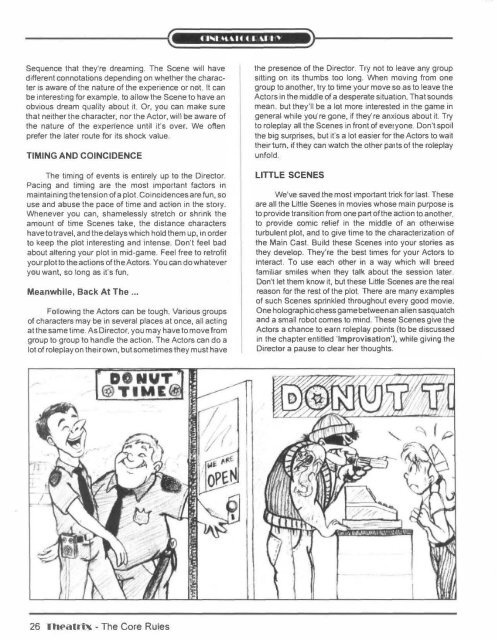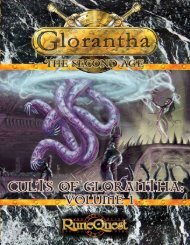Untitled - Index of - Free
Untitled - Index of - Free
Untitled - Index of - Free
Create successful ePaper yourself
Turn your PDF publications into a flip-book with our unique Google optimized e-Paper software.
Sequence that they're dreammg. The Scene will have<br />
dtfferent connotations depending on whether the charac<br />
ter ts aware <strong>of</strong> the nature <strong>of</strong> the experience or not It can<br />
be interesting for example, to allow the Scene to have an<br />
obvious dream quality about it Or, you can make sure<br />
that netther the character, nor the Actor, will be aware <strong>of</strong><br />
the nature <strong>of</strong> the experience until it's over. We <strong>of</strong>ten<br />
prefer the later route for its shock value<br />
TIMING AND COINCIDENCE<br />
The timing <strong>of</strong> events 1s entirely up to the Director<br />
Pacing and timing are the most Important factors in<br />
maintaining the tension <strong>of</strong> a plot. Coincidences are fun, so<br />
use and abuse the pace <strong>of</strong> time and action in the story.<br />
Whenever you can, shamelessly stretch or shrink the<br />
amount <strong>of</strong> time Scenes take, the distance characters<br />
have to travel, and the delays wh1ch hold them up, in order<br />
to keep the plot interesting and intense Don't feel bad<br />
about altenng your plot in mid-game Feel free to retr<strong>of</strong>it<br />
your plot to the actions <strong>of</strong> the Actors You can do whatever<br />
you want, so long as ifs fun.<br />
Meanwhile, Back At The ...<br />
Following the Actors can be tough. Various groups<br />
<strong>of</strong> characters may be in several places at once, all acting<br />
at the same t1me As Director, you may have to move from<br />
group to group to handle the action. The Actors can do a<br />
lot <strong>of</strong> roleplay on their own, but sometimes they must have<br />
26 Theatrix - The Core Rules<br />
the presence <strong>of</strong> the Director. Try not to leave any group<br />
sitting on its thumbs too long. When moving from one<br />
group to another, try to time your move so as to leave the<br />
Actors in the middle <strong>of</strong> a desperate situation. That sounds<br />
mean, but they'll be a lot more interested in the game in<br />
general while you're gone, if they're anxious about it. Try<br />
to roleplay all the Scenes in front <strong>of</strong> everyone Don't spoil<br />
the big surprises, but it's a lot easier for the Actors to wait<br />
their tum, if they can watch the other parts <strong>of</strong> the roleplay<br />
unfold<br />
LITTLE SCENES<br />
We've saved the most important trick for last These<br />
are all the Little Scenes In movies whose main purpose is<br />
to provide transition from one part <strong>of</strong> the action to another,<br />
to provide comic relief in the middle <strong>of</strong> an otherwise<br />
turbulent plot, and to give time to the characterization <strong>of</strong><br />
the Main Cast. Build these Scenes into your stories as<br />
they develop. They're the best times for your Actors to<br />
interact. To use each other in a way which will breed<br />
familiar smiles when they talk about the session later<br />
Don't let them know it, but these Little Scenes are the real<br />
reason for the rest <strong>of</strong> the plot. There are many examples<br />
<strong>of</strong> such Scenes sprinkled throughout every good movie.<br />
One holographic chess game between an alien sasquatch<br />
and a small robot comes to mind. These Scenes give the<br />
Actors a chance to earn roleplay points {to be discussed<br />
in the chapter entitled 'Improvisation'), while givtng the<br />
Director a pause to clear her thoughts.



